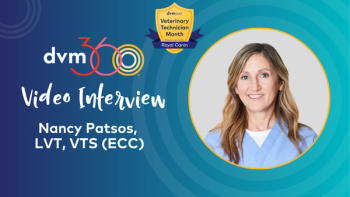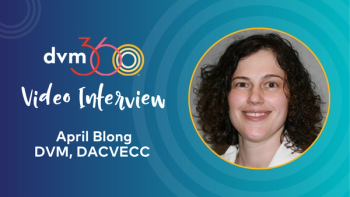
Stayin alive with RECOVER
If a patient arrests in your veterinary hospital, hows your resuscitation rate? Experts in emergency and critical care are collaborating on a mission to improve that number the world over.
Dr. Daniel Fletcher, one of the founders of the RECOVER initiative to standardize veterinary CPR protocols, works with a group of Japanese veterinarians who recently became certified instructors. Photo courtesy of the RECOVER initiative.A few months ago I was perusing my Facebook feed when a video posted by my friend and classmate
Turns out Dr. Fletcher, along with
Question: What is the RECOVER initiative?
Dr. Fletcher: RECOVER was started in 2011 to bring together about 100 veterinary specialists to develop the first set of evidence-based veterinary guidelines using the same process used to develop human CPR guidelines. We developed a series of about 70 questions about CPR, which we answered after reviewing more than 1,000 journal articles of primary literature. From those questions and answers, we created a set of 101 clinical guidelines. These were published in a special
1. Education: training people to do CPR according to the guidelines.
2. Research: pushing the limits of veterinary resuscitation science.
3. Guidelines: evaluating and updating the guidelines as science progresses.
Q: What inspired you to found this initiative?
Dr. Fletcher: I was mostly interested in developing standardized CPR training for veterinarians and veterinary technicians like they have in human medicine. I contacted my colleague Manuel Boller, Dr. med. vet., DACVECC, who was at the University of Pennsylvania at the time working in a high-power CPR research lab, to see if he would be interested in collaborating with me. He said he would but that no one had actually tried to figure out how best to do CPR in dogs and cats. We decided that the first step was to develop the guidelines, and RECOVER was born.
Q: What do you hope to accomplish?
Dr. Fletcher: We want every veterinary professional to know how to do CPR. For dogs and cats that arrest in the perianesthetic period, survival to discharge rates are quite high-50 percent-and this was true even before we had good guidelines! My hope is that every veterinary professional would know the guidelines to maximize their ability to save those savable lives.
Yagi: There is now a certification process in place to become a RECOVER-certified rescuer, which certifies your knowledge and skills in performing RECOVER CPR. This involves taking an online course for knowledge, then following it up with a simulation-based, in-person training. Then, individuals may move on to be certified as RECOVER-certified instructors through another in-person course.
Q: How did you two end up working together?
Yagi: I first met Dr. Fletcher at the Evidence-Based Veterinary Medicine Symposium held in June 2012 right when the new guidelines were being published. I went home energized, thinking we needed to implement RECOVER CPR at my practice, because at Adobe Animal Hospital we had variable experiences with CPR. We had no standardized protocol and so it could go well or poorly depending on the doctor on shift, the team members on shift, and whether our versions of “CPR” were similar enough. It all led to frustration and feelings of helplessness when we didn't feel like we did a good job or gave our patient the best chance.
We had some hurdles, but we did implement widescale CPR training that involved more than 60 people the first round. One thing we did was track outcomes. The next time I met Dr. Fletcher was at the International Evidence-Based Veterinary Medicine Congress in the U.K. He presented the RECOVER guidelines creation process, and I followed with a presentation on how we implemented the guidelines into practice with preliminary data on the outcomes since. We continued to discuss RECOVER and our experiences with CPR over fish and chips.
Dr. Fletcher and Dr. Boller also let me take part in the very first RECOVER CPR labs at the International Veterinary Emergency and Critical Care Symposium (IVECCS) as an instructor helper, and we discussed how veterinary technicians could play a role in RECOVER. I remember both so warmly saying, “We're very happy to have you and the vet techs on board with RECOVER” as we shook hands after the lab.
I was over the moon. Since then I've just been a nuisance to both Dr. Fletcher and Dr. Boller, asking about the next cycle of guidelines creation and where vet techs can play a role, trying to balance my excitement with respect for the process.
Luckily they didn't get fed up with me through all of it, and to keep an already long story short, they asked me onto the RECOVER team. When the program director position became available, it was evident that an opportunity like this would fill my cup. I am eternally grateful that they're giving me a shot at it.
Q: Tell me about your recent trip to Japan-how it was organized, what you hoped to accomplish, what you actually accomplished and next steps.
Dr. Fletcher: Ken, who is our RECOVER program director, has many connections in Japan, and he organized this trip. It was a collaboration between emergency and critical care veterinarians in private practice in Japan and some folks in academia who are interested in RECOVER. The goal was to train a core group of champions in Japan who could form the foundation of a Japanese RECOVER task force to spread the training throughout Japan and also to get involved in RECOVER's research initiatives and the next round of guidelines development.
Yagi: Emergency and critical care (ECC) is at the cusp of blossoming in Japan. There's been talk of establishing an ECC society and there's a lot of excitement surrounding emergency care. I thought learning from a world-renowned expert in ECC and CPR like Dr. Fletcher would serve as a catalyst for the advancement of ECC in Japan.
Q: What other recent events are associated with RECOVER?
Dr. Fletcher: We did RECOVER certification labs and instructor sessions at IVECCS 2017, and Ken did RECOVER workshops at the Southwest Veterinary Symposium and the Ontario Veterinary Conference. I went to St. Kitts to train some of the faculty and staff at Ross University to be instructors as well as run some labs for students. We were both at the Western Veterinary Conference in March for rescuer and instructor certifications and will also be doing some training at the European Veterinary Emergency and Critical Care Symposium in Venice in June. Whew!
Yagi: As I alluded to earlier, from an organizational and structural end, we have coined the terms “RECOVER-certified rescuer” for veterinary professionals certified in RECOVER CPR and “RECOVER-certified instructor” for those approved to certify more rescuers. We are establishing a network of instructors who will drive the certification process internationally.
We have a set of rescuer and instructor certifications planned at IVECCS 2018, and we're also excited about a “CPR battle”-a simulation-based CPR competition inviting CPR teams to compete against each other. IVECSS 2018 is going to be awesome! RECOVER rescuer and instructor certification sessions are also planned at VMX 2019 and WVC 2019.
Q: What are your greatest needs?
Dr. Fletcher: We're trying to grow our instructor network so that people who take our online training courses can then attend in-person workshops to really learn how to do CPR. We'd like to see an international network of trainers who can offer this at practices everywhere. Folks interested in taking a certification course or an instructor certification (which they can take after they're certified) should check out the website.
Yagi: My greatest need is more time to work on RECOVER because there's so much to accomplish. We're reaching out to RECOVER and ECC enthusiasts to join the initiative to further our efforts in education, guidelines creation and research.
Q: Is there a website or Facebook group?
Yagi: Our Facebook page is
Dr. Sarah Wooten is an associate veterinarian in Greeley, Colorado, a frequent contributor to dvm360.com and a speaker at the Fetch dvm360 conferences.
Newsletter
From exam room tips to practice management insights, get trusted veterinary news delivered straight to your inbox—subscribe to dvm360.






